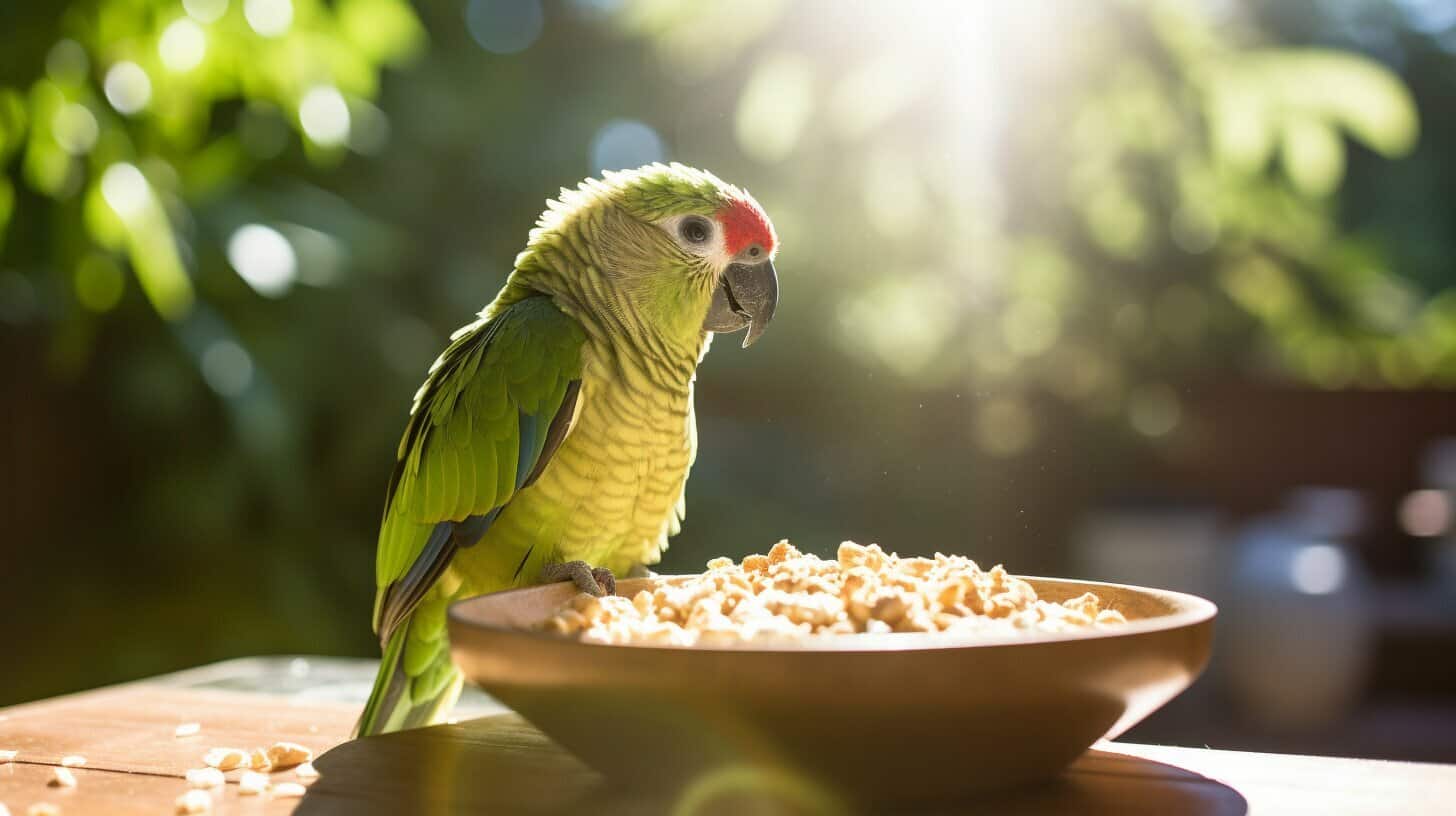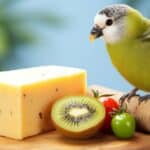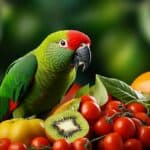If you’re a proud kakariki owner, you might wonder if oats are a healthy addition to its diet. After all, offering your feathered friend a balanced diet is essential for overall health and well-being.
In this article, we’ll explore the nutritional benefits of oats for kakarikis and discuss whether they can safely consume them. We’ll also provide tips and recommendations for incorporating oats into your kakariki’s diet and suggest alternatives.
Can Kakarikis eat oats? Yes, Kakarikis can eat oats. Kakarikis can safely consume oats as a part of their diverse diet. While oats provide the necessary nutrients, it’s essential to ensure they’re raw or cooked without additives. Like all birds, Kakarikis benefit from a balanced meal plan that includes a variety of seeds, fresh fruits, and vegetables. It is recommended to offer oats occasionally and not as a staple.
Key Takeaways:
- Oats are a nutritious food for kakarikis, providing them with essential vitamins, minerals, and fibre.
- As with any new food, it’s crucial to introduce oats gradually to your kakariki’s diet while monitoring its reaction.
- Consult an avian veterinarian before making significant dietary changes to your kakariki’s diet.
Understanding the Diet of Kakarikis
If you’re a proud kakariki owner, you probably already know these birds have unique dietary needs. In the wild, they consume various foods to meet their nutritional requirements. In captivity, it’s important to replicate these eating habits as closely as possible to keep your feathered friend healthy and happy.
Kakarikis are primarily herbivores, and their diet should be based on fruits, vegetables, and seeds. While the exact amounts vary depending on your bird’s age, activity level, and health status, your kakariki’s diet should always be rich in vitamins, minerals, and other nutrients.
The Nutritional Composition of Oats
Now that you know more about the typical diet of kakarikis, let’s dive into the nutritional value of oats. Oats are a great source of fibre, which can help keep your kakarikis’ digestive system healthy and aid in regulating their metabolism. Additionally, oats contain various essential minerals, including manganese, phosphorus, and zinc, which are important for maintaining health.
In terms of vitamins, oats contain B vitamins, which help with energy production and brain function, and vitamin E, which acts as an antioxidant and can help support a healthy immune system. Oats also contain a small amount of protein, which can help support muscle and tissue growth in your kakarikis.
So, overall, oats are a nutritious addition to your kakarikis’ diet and can provide a range of benefits for their health and well-being.
Benefits of Oats for Kakarikis
Oats are a great addition to your kakariki’s diet, providing numerous health benefits. Here are some specific advantages of feeding oats to your feathered friend:
| Nutrient | Benefits |
|---|---|
| Oats are rich in fibre, which helps with digestion and prevents constipation. | Oats contain fibre important for maintaining your kakariki’s overall health. |
| Minerals (Calcium, Magnesium, Iron, Potassium) | Oats contain a variety of minerals that are important for maintaining your kakariki’s overall health. |
| Vitamins (B1, B5, B6) | These vitamins help with energy production and play a crucial role in maintaining your bird’s well-being. |
By incorporating oats into your kakariki’s diet, you can improve their digestion, boost their energy levels, and maintain their overall health and well-being.
Can Kakarikis Safely Consume Oats?
Feeding your kakarikis oats can provide them with a range of health benefits, but it’s essential to ensure that they consume oats safely and in moderation.
One potential risk to note is that kakarikis may be allergic to oats. If you notice any adverse reactions, such as vomiting or diarrhoea, after introducing oats into their diet, consult with your avian veterinarian immediately.
Additionally, consuming too many oats can lead to digestive issues for your kakarikis. To avoid this, it’s crucial to monitor the amount of oats they consume and ensure that it doesn’t exceed 10% of their total diet.
It’s also essential to ensure that the oats you feed your kakarikis are free from any additives or sweeteners that can harm them. Only offer plain, uncooked oats to your bird.
When introducing oats into your kakarikis’ diet, start with small amounts, gradually increasing the portion sizes over several weeks. This will give their digestive system time to adjust to the new food and minimize the risk of any adverse reactions.
Remember, while oats can be a healthy addition to your kakarikis’ diet, it’s crucial to monitor their consumption and consult your avian veterinarian if you have any concerns.
Introducing Oats into a Kakariki’s Diet
If you’re interested in supplementing your kakariki’s diet with oats, it’s important to do so gradually and carefully. Introducing new foods too quickly can lead to digestive upset and potentially even harm your pet bird.
Mix a small amount of oats with your kakariki’s regular food, gradually increasing the amount over several weeks. Generally, oats should make up no more than 10% of your bird’s diet.
Another option is to offer oats as a treat, either on their own or mixed with other bird-friendly fruits and vegetables. Treats should comprise no more than 5% of your bird’s overall diet.
When preparing oats for your bird, use plain, uncooked oats. Avoid flavoured or sweetened varieties, which can contain harmful additives. You can serve oats dry or soaked in water, but be sure to discard any uneaten oats that have become damp or mushy.
Always provide fresh water alongside new food additions, including oats. And if you notice any changes in your bird’s behavior or droppings after introducing oats, consult your avian veterinarian immediately.
Some Creative Ways to Feed Oats to Your Kakarikis
Oats are a great place to start if you want to add a little variety to your kakarikis diet. Here are some fun and creative ways to incorporate oats into your bird’s meals:
- Mix oats with fresh fruit: Oats go great with many fruits, including apples, bananas, and berries. Mix a small amount of oats with chopped fruit for a tasty and nutritious snack.
- Use oats as a topping: Sprinkle a small amount of oats over your bird’s regular food for added texture and crunch. You can also mix oats with other seeds or nuts for a more complex topping.
- Make homemade oatmeal: Cook a small amount of oats in water, let cool, and serve to your bird just like you would a human. You can add a teaspoon of honey or a few raisins for added flavor.
- Add oats to homemade bird treats: If you like to make your own bird treats, try adding oats to the recipe for a healthy twist. Oats can be used instead of some of the flour in bird cookies or bars recipes.
- Offer oats as a standalone snack: Some birds enjoy eating oats independently, especially if they’re dry-roasted or toasted. Just be sure to monitor your bird’s intake and don’t offer too many oats at once.
Remember, while oats can be a healthy addition to your kakariki’s diet, offering them in moderation and alongside various other foods is important. If you have any concerns about your bird’s diet, consult with an avian veterinarian for personalized advice.
Monitoring Your Kakariki’s Oat Consumption
While oats can be a healthy addition to your kakariki’s diet, it is important to monitor their consumption to ensure they are not overeating and to avoid potential health issues.
As with any new food, it’s best to start with small portions and gradually increase the amount over time. This will allow your kakariki’s digestive system to adjust to the new food and reduce the risk of any negative reactions.
If you notice any changes in your kakariki’s behaviour, such as decreased appetite or increased lethargy, it may be a sign that they are eating too many oats. In this case, reducing the amount of oats they consume is important and consult a veterinarian if the behaviour continues.
Additionally, if your kakariki has any pre-existing health conditions, it’s important to speak with a veterinarian to determine if oats are a suitable addition to their diet.
Remember always to keep an eye on your kakariki’s overall diet and adjust their food intake accordingly to ensure they are receiving a balanced and healthy diet.
Alternatives to Oats for Kakarikis
If you’re looking to mix up your kakarikis’ diet or if you’re concerned they may have an allergic reaction to oats, various other grain and seed options are available.
One alternative to oats is barley, a good fibre and protein source. Quinoa is another excellent choice, containing protein, vitamins, and minerals. Millet is a popular option found in many birdseed mixes and a good carbohydrate source.
If you’re looking for seeds that are similar to oats, consider trying chia seeds or flaxseeds. Chia seeds are high in omega-3 fatty acids, while flaxseeds are a good source of fibre and antioxidants.
It’s important to note that while these alternatives may provide similar nutritional benefits to oats, it’s still important to introduce them gradually and monitor your kakarikis’ reactions to ensure they do not have any adverse effects.
Potential Risks and Considerations
While oats can be a nutritious addition to your kakariki’s diet, there are a few potential risks and considerations to keep in mind.
Allergies
Like all foods, some kakarikis may have an allergic reaction to oats. If you notice any signs of an allergic reaction, such as itching, swelling, or difficulty breathing, stop feeding oats immediately and consult with your avian veterinarian.
Impact on Digestion
Feeding too many oats to your kakariki can cause digestive issues such as constipation. It’s important to monitor their oat consumption and adjust their diet to prevent any issues.
Should Be Fed in Moderation
While oats can be a healthy addition to your kakariki’s diet, they should be fed in moderation. Too much can lead to an unbalanced diet and weight gain. As a general guideline, oats should make up no more than 10% of your kakariki’s total diet.
By following these guidelines and monitoring your kakariki’s oat consumption, you can safely incorporate this nutritious grain into their diet and provide them with a varied and healthy meal plan.
Consulting with an Avian Veterinarian
Regarding your kakarikis’ diet, it’s always best to consult with an avian veterinarian to ensure that their nutritional needs are being met. A veterinarian can provide personalized recommendations based on your bird’s age, health, and activity level.
If you’re considering adding oats to your kakarikis’ diet, your veterinarian can help you determine the appropriate portion sizes and frequency of consumption. They can also advise you on any specific risks or concerns related to your bird.
Additionally, a veterinarian can help you monitor your kakarikis’ overall health and any potential diet changes, including oats consumption. This can help prevent any health issues and ensure your bird receives a balanced and nutritious diet.
Remember, adding new food to your bird’s diet should always be done gradually and cautiously. Your avian veterinarian can guide you through the process and help you make informed decisions about your kakarikis’ nutrition.
Conclusion
Congratulations, you now know that oats can be a nutritious addition to your kakariki’s diet. As we’ve discussed, oats are high in fibre and contain essential vitamins and minerals that can improve your bird’s digestion and energy levels.
Always monitor your bird’s oat consumption and adjust its diet accordingly. If you have any concerns or questions about introducing oats to your kakariki, don’t hesitate to consult with an avian veterinarian for personalized advice.
Final Thoughts
Feeding your kakariki a varied and balanced diet is crucial for their health and well-being. While oats can make a healthy and tasty addition to their meals, don’t forget to include other bird-friendly grains, seeds, fruits, and vegetables. With creativity and experimentation, you can ensure your feathered friend enjoys a delicious and nutritious diet.
FAQ
Q: Can kakarikis eat oats?
A: Oats can be a nutritious addition to a kakariki’s diet. They offer various health benefits and are generally safe for consumption.
Q: What is the typical diet of kakarikis?
A: Kakarikis have a varied diet that includes fruits, vegetables, and seeds. They also enjoy foraging for insects and other small prey.
Q: What are the nutritional benefits of oats?
A: Oats are rich in fibre, minerals, and vitamins, making them a nutritious food choice for kakarikis. They can support digestion and provide energy.
Q: What are the specific benefits of feeding oats to kakarikis?
A: Feeding oats to kakarikis can improve digestion and energy levels. They can also enhance overall nutritional intake.
Q: Are oats safe for kakarikis?
A: Oats are generally safe for kakarikis to consume. However, it is important to introduce them gradually and monitor their consumption for any adverse reactions.
Q: How can oats be introduced into a kakariki’s diet?
A: To introduce oats into a kakariki’s diet, start with small amounts and gradually increase over time. It is advisable to mix them with other foods your kakariki enjoys.
Q: What are some creative ways to feed oats to kakarikis?
A: You can mix oats with fresh fruits or use them as a topping for your kakariki’s regular food. This adds variety and can make mealtime more enjoyable for your pet.
Q: How should I monitor my kakariki’s oat consumption?
A: It is important to monitor the amount of oats your kakariki consumes and adjust their diet accordingly. Consult with an avian veterinarian for personalized advice.
Q: Are there alternatives to oats for kakarikis?
A: Yes, some other grains and seeds can be included in a kakariki’s diet, such as quinoa, millet, and sunflower seeds.
Q: What are the potential risks and considerations when feeding oats to kakarikis?
A: While oats are generally safe, some kakarikis may have allergies or digestive issues. Observing your pet and consulting with a veterinarian if any concerns arise is important.
Q: Should I consult with an avian veterinarian regarding oats in my kakariki’s diet?
A: It is always advisable to consult with an avian veterinarian for personalized dietary advice and recommendations for your kakarikis.



Have comments or questions about this article? Then get involved!
Spotted an error or something we have missed? Let us know